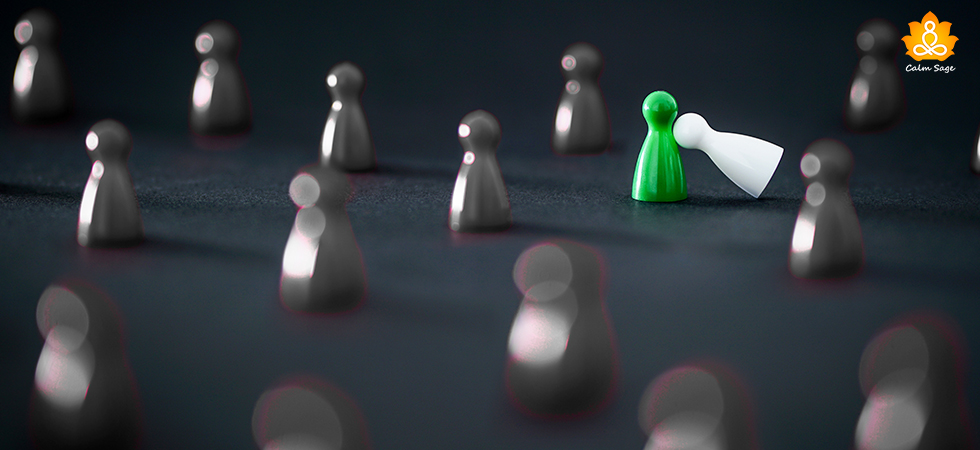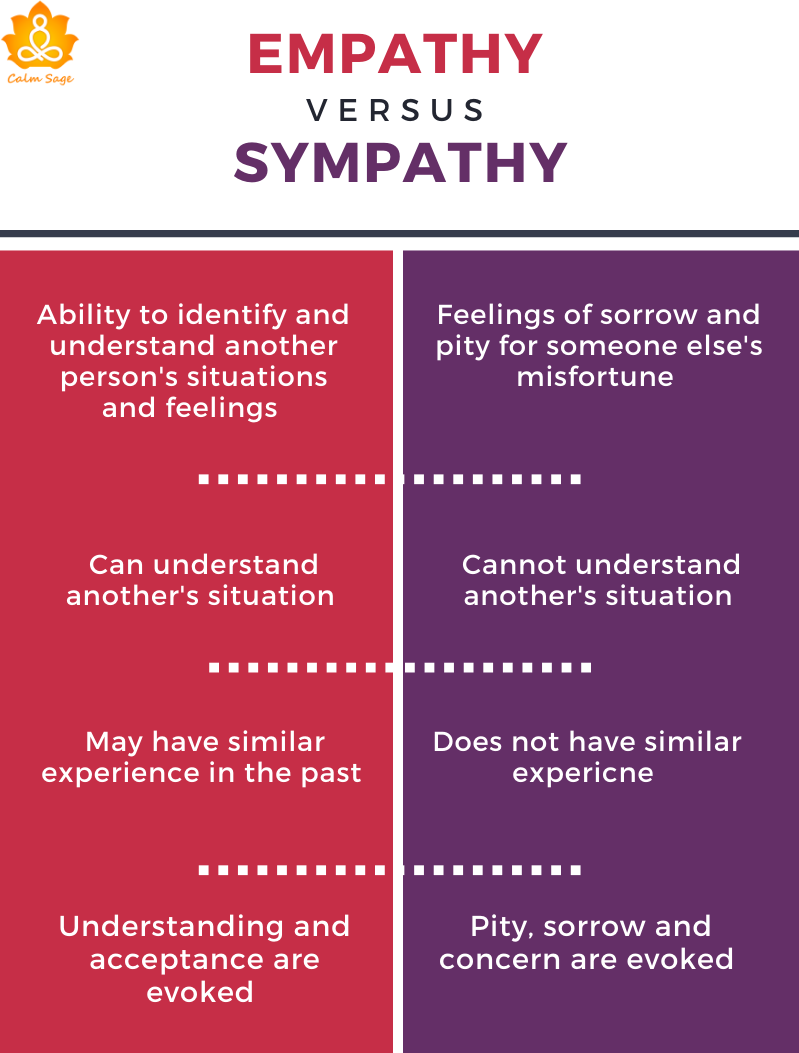Signs and Traits That Show You’re An Empath

What is Empathy and What does it Mean to be an Empath Person?
Empathy is defined as the capability to understand others’ emotions and feelings from an emotional point of view. To put it in a nutshell, empathy is all about putting yourself into someone else’s shoes. Means putting yourself in someone else’s situation to exactly feel what they’re going through right now.
Related Read: Empathy Statements to help you in Difficult Situations
Empathy is when you see someone suffering and instantly you can feel what they’re going through. Empathy is when you feel sympathy from the heart and easily catch the feelings and thoughts of someone you’re listening to or seeing.
Well, there’s a twist…people are not even in sync with their emotions and feelings. Therefore, it becomes a bit more difficult to be empathetic towards someone.
People always get confused between the two terms, sympathy and empathy. These two are completely different. To understand the difference between sympathy and empathy, refer to the image below.

Signs and Traits of an Empath Person:
1. Lots of Empathy
An empath is the one who practices empathy. Empathy is defined as the capability of understanding someone’s experience and feelings by adding your perspective into someone’s issues.
For example, think your best friend’s mom is just diagnosed with level 3 cancer. Empathy allows you to understand the feelings and emotions of your best friend.
Even if you have never experienced something like this, however, you don’t only feel the emotions and pain. You also take steps further to help your friend. Your best friend’s pain and emotions become part of your pain and emotions.
Also Read: How to Be Empathetic: Top 5 Ways
2. You can feel the intimacy and closeness
Meanwhile, someone shares their feelings and emotions with you… you feel intimacy and closeness with him\her. Empath always wishes for having a lasting relationship with someone they are close to.
However, sometimes this leads to chronic stress, overwhelmed, and worries about losing yourself. If you’re also feeling something like this, click here to connect with a mental health expert from BetterHelp.
Empath also feels frayed nerves or sensory overload which is caused by talking too much about someone’s issues. However, to avoid such situations, you might set healthy boundaries. If you’re not able to do so, consider seeking professional help.
3. Always keep good intentions
Empathy does not only mean keeping your feet in someone else’s shoes, empathy is also related to keeping good intentions towards others.
Even if someone is being dishonest with you, you never intend to have bad intentions against them. This empathy trait belongs to you when someone hurts you and you still do not feel bad about them. Instead of keeping bad intentions, you understand them deeply and their reasons behind their actions.
Also Read: What Are The Different Types Of Attachment & Which One Is Yours?
4. Comfort is your priority
However, before anything you have prioritized your comfort. Empaths are more drawn to remote areas and nature, the natural environment provides a more calming space to them.
Watching waves and hiking alone makes brings them at peace. Empaths love nature walks, walking works as a stress reducer to them. Loud places and people are not their comfortable place.
5. You don’t like crowded places
As mentioned above, empaths belong to the natural environment. Thus, they don’t like crowded places and people. They like everything subtle and calm.
Our therapist from the team rightly stated, “if you can easily sense how others feel, you’ll likely have a hard time handling the emotional “noise” from a crowd, or even a smaller group of people, for an extended period.”
6. Not Caring Makes you Uncomfortable
Empaths generally have a caring nature. Although they don’t expect much from people, when someone has uncaring nature, it kind of makes them uncomfortable. They won’t speak and they won’t utter a single word, they start maintaining a distance.
When an empath begins to maintain a distance from someone, it means you need to change your nature or you should begin to caring others as well. When empaths are surrounded with negative energy or toxic people, it causes distress to them. This is the reason, they have fewer friends but they are loved by all.
7. People are Close to You
Due to their good listening skills, many people are close to them, but they are close to few. Empaths are easily not found, therefore, they somehow learn to enjoy their own company with time. People feel comfortable with them and tend to share everything with empaths.
The only disadvantage of being an empath is that empaths are vulnerable to toxic behaviors and manipulation.
However, it is important to understand that empaths cannot do much for people (except understanding and feeling the same emotions), if someone is not ready to change, they should stop stressing about it.
Also Read: Stay Away From These Types of Toxic People
8. Highly Sensitive towards sensations, smells, and sounds

Empaths have amplified sensitivity towards emotions and feelings. People might relate highly sensitive people with empaths, however, they both are two different things.
Highly sensitive empath means having the strong sensation of fragrances and odors, strong sensation towards jarring sounds, prefers the music at low volume, and certain sound triggers an emotional response.
9. You need Space to Bounce Back.
When empaths experience negative situations in life, it takes time to deal with negative emotions. That does not make them an introvert. Empaths can also be extroverts, it all depends on the behavior spectrum.
Additionally, extroverted empaths need extra time to bounce back as they need to restore emotions. Introverted empaths need little extra time to reset.
10. You Know How to Manage Conflicts
Does not matter if you’re an extroverted empath or an introverted empath, you know how to manage conflicts. Also, you’re likely towards avoiding conflict with people. Due to high sensitivity, you know how to not hurt someone’s feelings.
Additionally, empaths are sensitive towards receiving criticism. Fights and arguments with others cause stress since it takes time to deal with reactions and feelings.
Related Read: Are you an introvert or an extrovert?
11. You have a Feeling That You Don’t Fit In
Sometimes when you do not match with others’ vibes, you often demotivate yourself with the feeling that you don’t fit in. however, you must always remember that so many people are close to you and they are counting on you.
Therefore, you should never demotivate yourself and always become an inspiration for others as well. It might happen often that people take time to understand you but this should never be the reason behind your exhaustion.
12. You Easily Isolate Yourself from Toxicity
The best thing I love about empaths is that they know when to isolate themselves. Knowing this makes them perfect humans. Whenever they feel something wrong, they begin to isolate themselves from the negativity. Empaths are also animal lovers as they intensely feel the bond towards them.
13. Not an Expert in Setting Boundaries

Being the perfect humans, the other disadvantage of being an empath is the inability to set boundaries. Boundaries are important in every type of relationship. You take time to realize when to stop giving.
This behavior makes empaths unable to decipher their emotions; at this phase, empaths should learn how to set healthy boundaries. If you’re also struggling with the same, consider seeking help from a professional therapist.
Connect with the Online Therapist Now
Disclaimer: As BetterHelp Affiliate, We may receive compensation from BetterHelp or other sources if you purchase products or services through the links provided on this page.
14. World is a strange and unique place for you
Despite having the ability to understand other’s emotions, the world is still a strange and unique place for you. This is because deep emotional understanding drives your intuitions and this results in picking up the relationship that does not make any clear sense of vision. Consequences are disengagement, disinterest, and struggling hard to thrive.
15. Hard time to cope with emotional and sensory overload
Empaths tend to protect themselves from taking on other’s emotions. However, self-care practices and setting healthy boundaries help empaths to live a better life.
If you’re also struggling with managing your overstimulation, a professional counselor can help you in learning developing boundaries, and identifying better self-care approaches.
To connect with a certified therapist from BetterHelp, click here.
Types of Empathy
- Try becoming a good listener.
- Pay attention to details
- Try to understand people without judging and being toxic towards them.
- Do not end the conversation until and unless you understand every detail about the problem.
- Try to put yourself in the shoes of the person.
There are three types of empathy:
1. Cognitive Empathy: Cognitive empathy is all about focusing on someone’s thoughts, feelings, and emotions.
2. Emotional Empathy: Emotional empathy comes into the picture when you connect emotionally with someone.
3. Compassionate Empathy: Compassionate empathy is all about understanding someone’s emotions and feelings and helping them with taking an action for resolving the problems.
If you want to read types of empathy in detail, click Types of Empathy you need to know
Tips for Practicing Empathy
I hope this blog helps you understand empathy and the signs of empathy. Comment down and let us know the importance of empathy in your life. For more such content, follow Calm Sage on all social media platforms.
Thanks for reading.
Next Read:
Psychopath vs Sociopath: What’s The Difference?
Left Brain vs Right Brain: What’s The Difference?
10+ Best Advice From Therapist That Will Change Your Life Forever




















